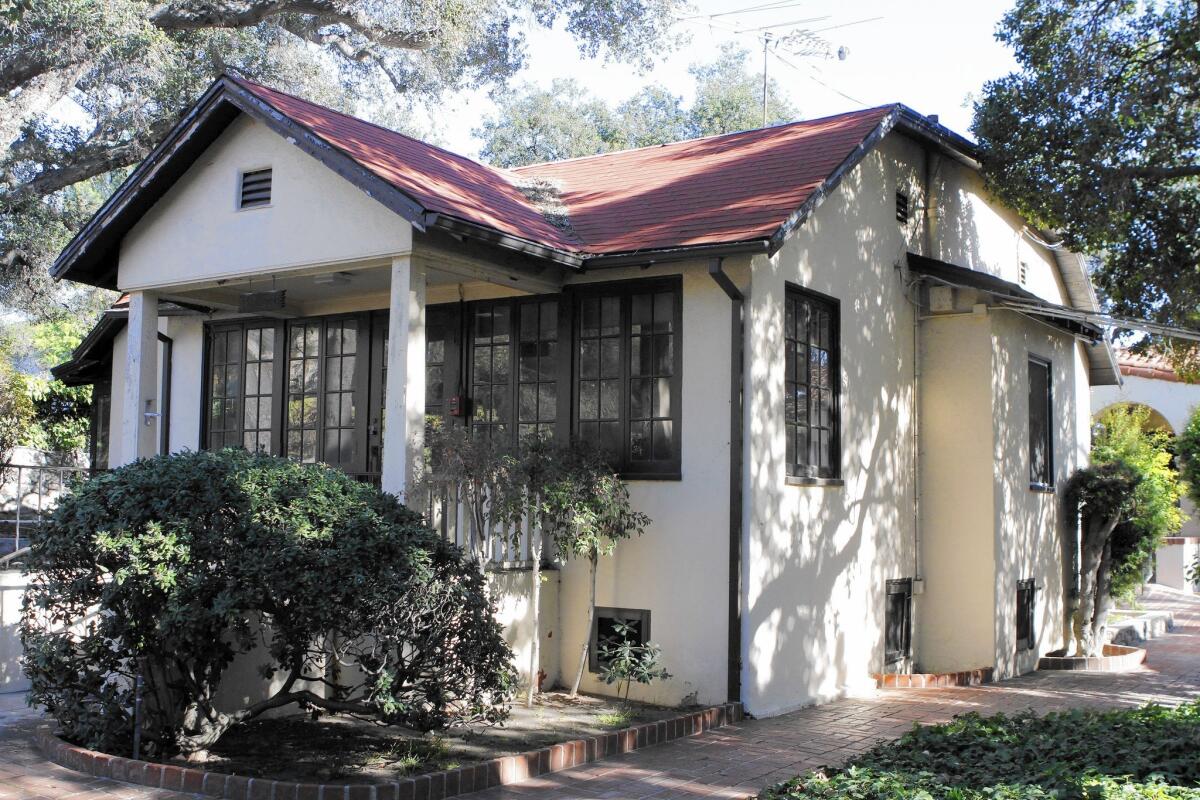The future of Rockhaven: reopen as a mental health facility or turn into a shopping center?

Rockhaven Sanitarium in Montrose, which closed in 2006, may revert back into a mental health facility or turn into a boutique shopping center. The Glendale City Council on Tuesday initiated a submittal process for proposals for the site.
Proposals are being sought to convert the former Rockhaven Sanitarium in Montrose into a boutique shopping center or revert it back into a mental health facility following City Council direction on Tuesday.
The 4-1 vote to open the submittal process was met with disappointment from members of the Friends of Rockhaven group, which gives tours of the property — currently closed to the public — and wants the site to become a park with a museum.
Council members, however, said that because some of the 15 buildings on the 3.3-acre site need restoration and upkeep, the concept of “adaptive reuse” may be the best way to preserve Rockhaven.
NEWSLETTER: Stay up to date with what’s going on in the 818 >>
“Nowhere in preservation have I heard the idea that a building should not be given life again, that it should be closed down and not rented out, not used,” said Councilwoman Laura Friedman.
“Adaptive reuse is very often the solution to saving a building,” she added.
Rockhaven opened in 1923 and closed in 2006. The city bought the campus two years later for $8.25 million to keep it from being demolished and turned into a senior-housing project.
There was a similar process to find a developer for a public-partnership for Rockhaven in 2014, but that project fizzled out when no favorable plan came forward.
Last fall, there were closed-door discussions between the council and city staffers about new interested parties, including psychiatrist Timothy Pylko, who wants to change the campus back to a mental-health facility.
Experienced in adaptive reuse projects with old buildings, Newport Beach-based Brooks Street Lab Holdings, LLC also expressed interest.
However, several council members said what will be the most important aspect of any project is how much access the public is going to have.
“I want everyone to know I’m committed to my desires to preserve the historic integrity of Rockhaven,” said Councilwoman Paula Devine. “I think that’s all of our intentions, and we all want to see some open space.”
Those sentiments were taken into consideration by city staff members, who drafted a 120-point grade scale for assess proposals. Some of the categories have 30-point maximums, including “dedication to preservation” and “creation of open space/accessibility.” A “return on investment” carries just five points.
The same report weighed the advantages of the mental health and boutique shopping center scenarios. While the shopping center would allow for more open space, selling Rockhaven and letting it operate as a mental-health facility would yield the highest financial return for the city.
Around the time Rockhaven was bought, Members of Friends of Rockhaven claim they were promised by city officials that the property would be converted into a park for the public.
However, Mayor Ara Najarian — the only sitting council member at the time of the acquisition — said any city staff promises like that were unauthorized and only two council members expressed an interest in the park idea. No vote was cast on the issue.
Friends of Rockhaven President Joanna Linkhorst told the council during the meeting that limiting any future Rockhaven project to a mental-health facility or a boutique shopping center would hinder the organization’s goal.
“This [request for proposal] excludes the option of anyone submitting a plan to create a historic park,” she said. “We have a chance to make something great, something unique, something that is fully intact.”
Councilman Vartan Gharpetian cast the lone dissenting vote to initiate the submittal process, saying he’d like to see an assessment of financial resources as to why Rockhaven couldn’t be transformed into a park.
It costs about $50,000 annually for the city to maintain the largely unused Rockhaven currently, said city spokesman Tom Lorenz. That cost could balloon to the hundreds of thousands after a park conversion, he added.
City Manager Scott Ochoa said in a phone interview that spending millions to make Rockhaven a park would only make it a passive park, meaning no room for sports or other recreation uses, meaning it likely wouldn’t generate that much use or interest from the public, he added.
Sean Bersell, executive director of the Glendale Historical Society, commended members of the Friends of Rockhaven for their steadfast push for preservation, but he added that it’s time for the city to find another appropriate use.
“We take the city at its word that it’s highly unlikely it will be able to restore the property to its former state,” Bersell said. “Therefore, we believe it is prudent for the city to look at options for rehab and adaptive reuse.”
--
Arin Mikailian, arin.mikailian@latimes.com
Twitter: @ArinMikailian
